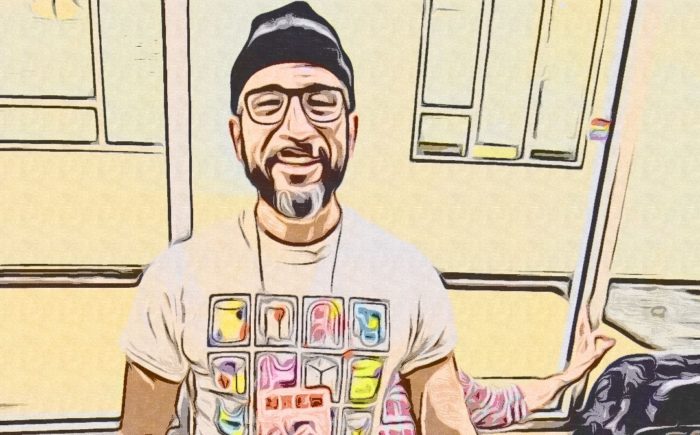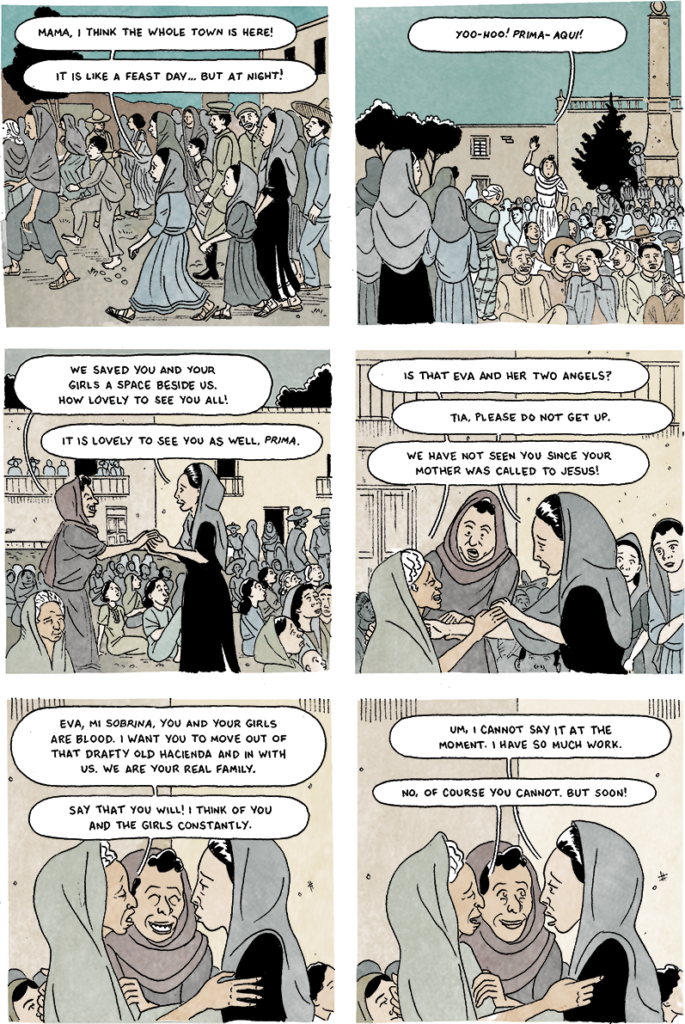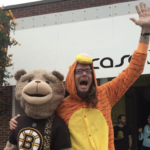
Graphic novelist Dave Ortega recounts his grandmother’s immigration story
Dias de Consuelo, Dave Ortega’s nonfiction comic book account of his grandmother Consuelo Castañon Herrera’s childhood, begins with the courtship of her parents in Fresnillo, Zacatecas, Mexico, a bit north of Mexico City. Their romance is formal and drawn out, but it is 1914 and the Mexican Revolution has soldiers stopping people in the streets, so they hasten their plans and are married that May. Consuelo arrives in December.
The title translates as “Days of Consuelo,” but it’s also a play on words as Consuelo means “comfort,” so the title can also be read as “Days of Comfort.”
Between Ortega’s first issue, which he published in November 2015, and the sixth and final issue, which has just arrived (daveortega.storenvy.com), the series has become a story of three generations of women—Consuelo and her mother and grandmother—navigating the tumultuous years of the revolution and subsequent clashes between the Mexican government and Roman Catholic Church.
“So as war does, it disrupts norms,” the Somerville author and artist says. “You see the family broken up. You see these women on their own in a community during wartime.”
Ortega’s story offers glimpses into the history of the era while he focuses on the details of his family’s story. Their men go off and don’t come back. Consuelo’s grandmother runs the family shop for a while and teaches and cares for Consuelo. Her mother becomes a seamstress and struggles to keep up with the work. Young Consuelo attends school and does what she can to help.
When Consuelo talked about her mother and grandmother, Ortega recalls, “there was this kind of glow around them.” Traditionally, he says, “women are very revered in Mexico,” tracing back through Catholic traditions as well as Aztec customs. Ortega says, “These women did need to band together in kind of a nontraditional way.”
“Dias de Consuelo” follows Consuelo and her family until they cross the border into the United States in 1925 when she was 10. “A border,” Ortega writes, “not just between countries, but between two parts of her life.”
Ortega says the comics began simply a way to get to know his grandmother better, when she was already in her 90s. “It started with me collecting information from my grandmother, giving her a call every so often, and getting her life story down. I was feeling guilty about not knowing any of it,” Ortega says. “I didn’t really have a project in mind.”
He did take notes.
Ortega grew up in El Paso, in desert western Texas, right along the US-Mexico border, and moved to the Boston area after college, in 2000. He works as the programming coordinator and production assistant at the Somerville Media Center. Invitations to teach workshops at Boston’s Institute of Contemporary Art and Museum of Fine Arts in recent years encouraged him to pursue an ambitious project.
So Ortega took on the responsibility of being a keeper and teller of the family story. He typed up his notes. He mapped out pages in sketchbooks, scanned them into his computer, printed out the designs on Bristol board. He inked them with brushes and Micron pens that give his drawings their signature fine line. He scanned the drawings, colored them in his computer, and had them all printed as comics by California’s RA Comics Direct.
“Starting this project before Trump took office, there was this kind of Obama optimism that everyone had,” Ortega recalls. But after Trump’s election “there was this tonal shift in the country.”

“The Trump administration had spent their campaign demonizing immigrants,” Ortega says. “So he felt he needed to act on it. … He took a very anti-immigration position.”
Ortega says, “You saw immigration clamped down. You saw kids in cages.”
“All this was going on as I was writing my grandmother’s immigration story,” Ortega says. Despite the United States’ long tradition of racism against brown people, he says, “that was a more humane immigration scenario compared to 2020. … These are dark days for the country in general, but especially for immigration.”
“Official history as we know it is largely the story of men—and white men at that,” Ortega says. “Getting more stories about immigrants out there and marginalized voices, these really are the voices we need to be listening to now.”
“With the rise of Black Lives Matter in the past month, it is important to let these voices be heard without the introductory white voice that’s always there. It’s time for the white voices to step aside and ask what the Black and brown stories are. It’s time for them to just be told. And just more of them.”
In referring “to white people as a group,” Ortega writes, “I mean the cultural gatekeepers (publishers, art institutions, curators, programmers) who—more often than not—frame Black and brown narratives defaultly through a white lens. As important as needing more people of color creators, we need more people of color in important gatekeeping positions (CEOs, boards of directors, curators, publishers) to finally change practices that often present these works as specially presented windows into the ‘other’—sectioned off and under banners of diversity—that exist outside of the regular offerings. I’m sure I’m not the first to say that artists, readers and audiences need to feel as though they aren’t just being fed scraps when being offered ‘a place at the table.’”
Consuelo Castañon Herrera died in July 2018 at age 103. “She saw four issues fully published and she saw a draft of issue five. … She was thrilled the way anybody would be when someone is taking the time to tell the story of your life,” Ortega says. “She loved it. So I did something right.”
“My grandmother’s story is a testament on why immigrants are the backbone of the country,” Ortega says. “Immigrants have been and they always will be convenient political scapegoats. … It’s hard to be optimistic when kids are still in cages, frankly, but I’m optimistic that people will see through the con job of the Trump administration and more humane days are ahead.”
Greg Cook runs the Wonderland blog (https://gregcookland.com/wonderland/) and is scheduled to begin painting a mural in Salem's Punto Urban Art Museum in October (http://puntourbanartmuseum.org).

